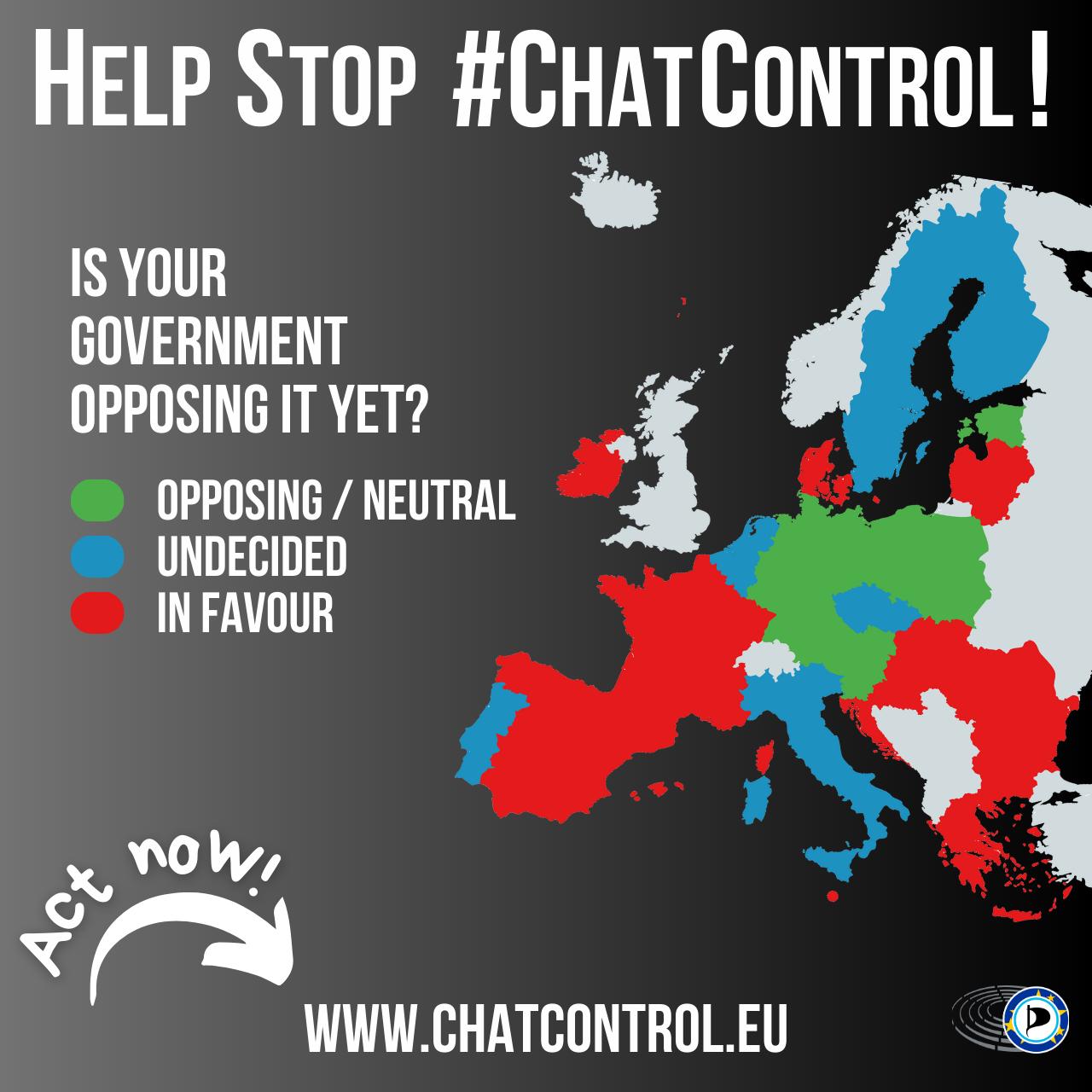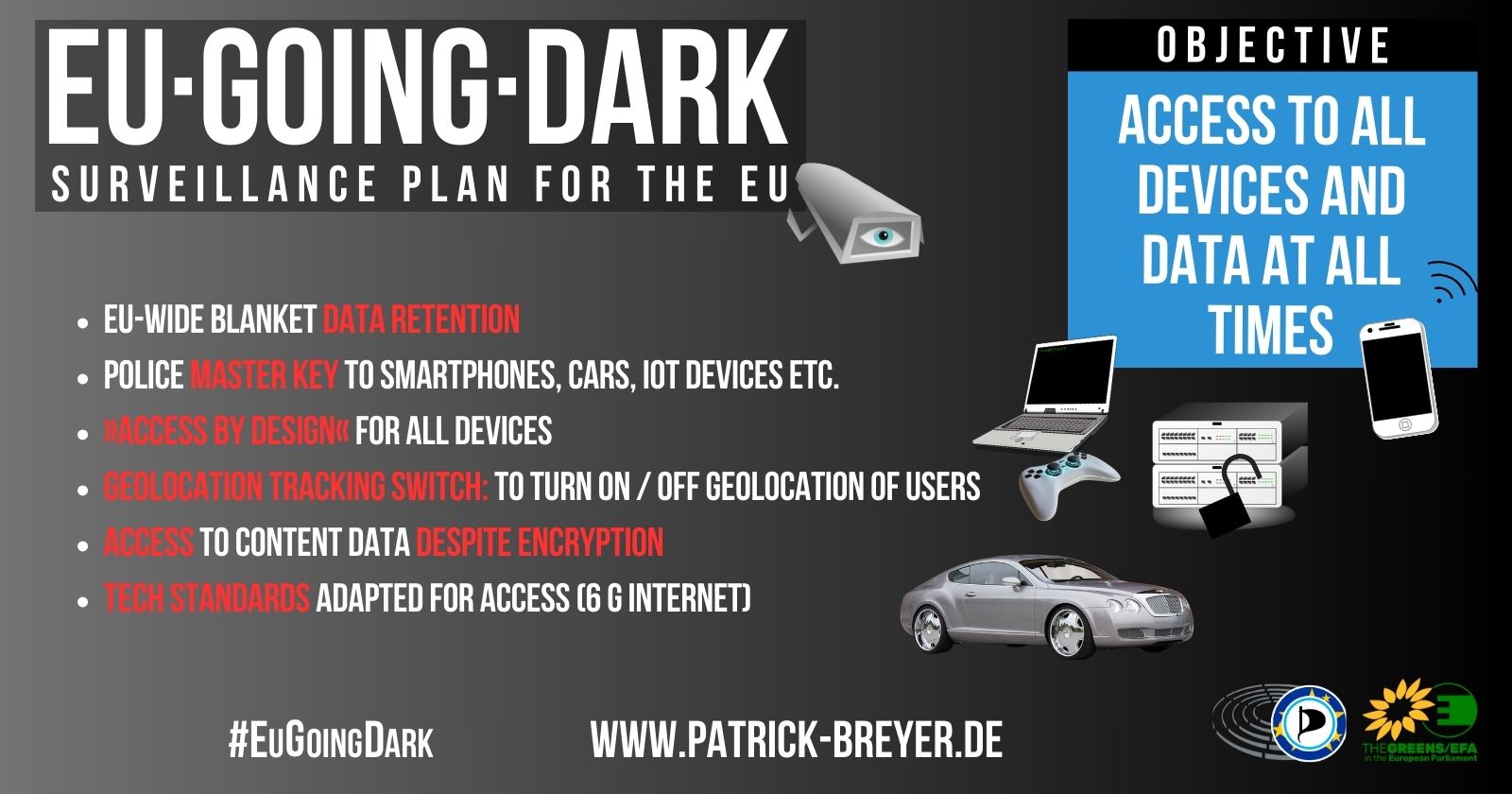Public »Going Dark« Consultation: Pirate MEPs call for an end to the undemocratic surveillance forge
The EU High-Level Group (HLG) on access to data for effective law enforcement, also known as the #EUGoingDark group, is consulting non-governmental organisations today. Newly published documents confirm criticism by Pirate Party Members of the European Parliament.
MEP Patrick Breyer (Pirate Party / Greens/EFA) comments:
„The #EUGoingDark work group should be dissolved! I have received the answer to my latest request for documents conceding that this group sees itself as “first step in the preparatory process of possible legislative proposals” (PDF). This makes it clear that undemocratic preliminary negotiations are conducted here with the predefined goal to re-introduce EU-wide blanket data retention of citizen’s communications data, to undermine secure encryption and to introduce the »Security by Design«-concept that should better be called »Surveilance by Design«. The group is undemocratic because NGOs and scientists are prevented from participating on an equal footing. How is equal participation supposed to work if NGOs have access neither to the actual meetings of the group and its sub-groups, nor to other participants nor to the actual work documents? It must be assumed that today’s input of NGOs has no chance of helping to shape the final result in favor of civil liberties. Meanwhile European and US-American police are forging surveillance plans behind closed doors. Belgium, for example, presented its unlawful data retention act as exemplary and spread the false claim that without data retention there is a need to resort to more intrusive methods of investigation. NGOs on the other hand, were only invited to today’s separate meeting after public pressure. The real purpose of this exercise is to keep them away from the table where the actual proposals are drafted. The results of the #EUGoingDark-group, which are to be presented as early as mid-2024, will be undemocratic and non-transparent. They must therefore not be used as legislative or political proposals. As the #EUGoingDark working group cannot achieve a useful result with this working method, the group should be dissolved.“
Marcel Kolaja, Member and Quaestor of the European Parliament for the Czech Pirate Party, comments:
“The right to privacy is a fundamental human right. Yet in recent years we have seen more and more attempts to challenge it. Whether it is the attempt to impose blanket spying on private messages or the legalisation of biometric cameras. The #EUGoingDark group is just another example of the way that many lawmakers see privacy as a burden rather than a priority. If it were a priority, we could observe a transparent debate that actively seeks out all relevant opinions. Instead, only representatives of the police or intelligence services were selectively invited, while representatives of human rights NGOs were left out. I find this practice unacceptable. The debate on privacy should be treated with the utmost respect. The #EUGoingDark group utterly fails to meet this requirement.”
Mikuláš Peksa, Member of the European Parliament for the Czech Pirate Party, comments:
“Activities and goals of this particular group present an attack on everything that keeps us safe in the online environment. We are used to see similar institutions in China’s digital dictatorship, where they persecute, bully and attack Tibetans and their fundamental rights, as well as Uighurs and other groups of citizens. In free and democratic Europe, such a thing has no place. Our private data should stay private, always.
“As Pirates, we call on the Commission to ensure the right to anonymity, free speech, access to information and right to encryption to all European citizens. Those protect not only citizens from data breaches, but also whistleblowers, human rights defenders and other activists.”
Anja Hirschel, top candidate of the German Pirate Party for the 2024 European elections, comments:
“The composition of the committee, in particular the exclusion of NGOs, already clearly shows what kind of encroachments on digital freedoms citizens are to face here: Even deeper and easier access to our data. Every previously private area is to be scrutinised in future. And this is being done by a working group that has its own interests in this data and has also avoided the public eye for the preparations themselves. Instead of the next step towards transparent citizens, we need more transparent EU policy!”


